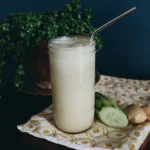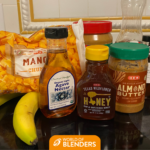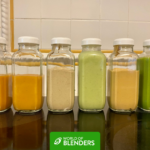This post may contain affiliate links. If you use these links to buy something we may earn a small commission. Thanks.
I’ve been a powerlifter for years and my baseline protein intake is over 250g a day. That’s just the norm… When I’m trying to build muscle, I’ll be hitting 300-350g of protein a day.
Smoothies are the only way I can hit that every day without spending a fortune on meat or eating all day long.
I’ve put together a list of 37 smoothie ingredients to help you add protein to smoothies without protein powder! If you’re trying to figure out how to add protein to smoothies – I’ve got you covered.
These 37 ingredients are used in our list of high protein smoothies without protein powder!
I’ll also share 11 of my favorite protein-packed smoothie recipes at the end.
- 40 Ingredients That Add Protein To Smoothies
- Deeper Dive on the 15 Best Ingredients to Add Protein to Smoothies
- 11 Protein-Packed Smoothie Recipes
- 1. Berry Almond Smoothie (23.1g of protein)
- 2. Chocolate Banana Smoothie (22.9g of protein)
- 3. Green Protein Smoothie (22.7g of protein)
- 4. Spinach & Mango Smoothie (22g of protein)
- 5. Tropical Mango Smoothie (21.1g of protein)
- 6. Vanilla Berry Smoothie (20.5g of protein)
- 7. Peanut Butter Banana Smoothie (20.5g of protein)
- 8. Apple Cinnamon Smoothie (20.4g of protein)
- 9. Oatmeal Banana Smoothie (16.5g of protein)
- 10. Chocolate Almond Smoothie (15.9g of protein)
- 11. Peanut Butter Blueberry Smoothie (15.6g of protein)
- Common Questions About Adding Protein To Smoothies
- Final Verdict: How To Add Protein To Smoothies Without Protein Powder
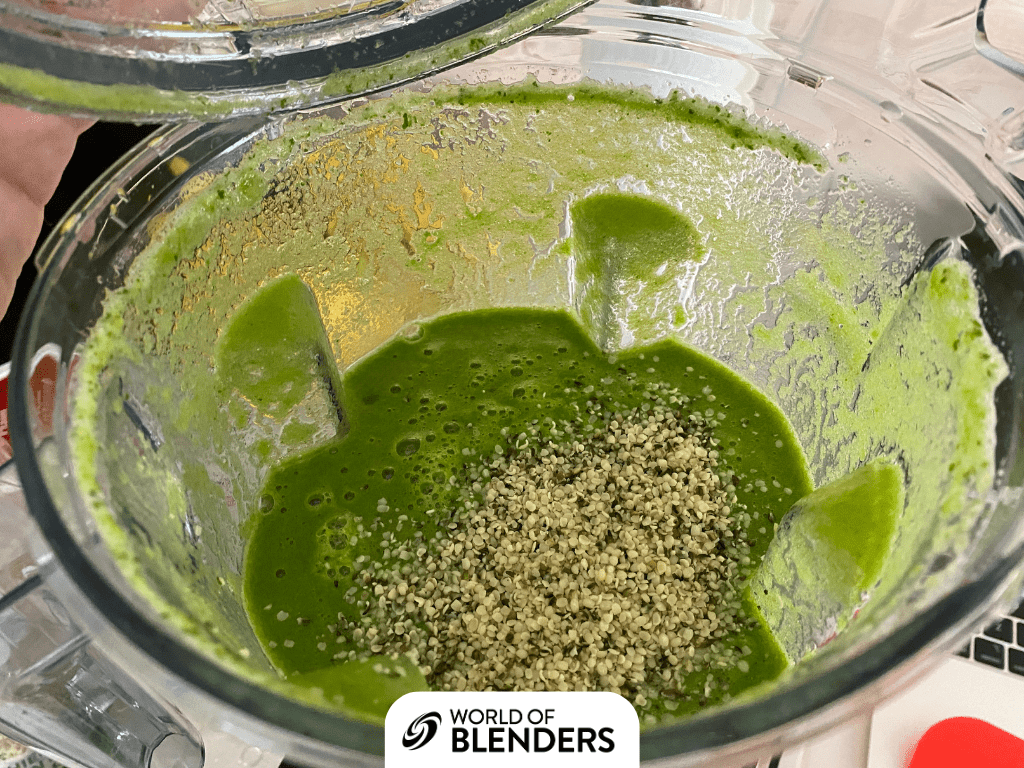
37 Ingredients that Add Protein to Smoothies
In the table below, you’ll find 37 of the best ingredients to add protein to your smoothies without using protein powder.
Adding just one of the top ingredients will give your smoothie a big protein boost. Cottage cheese, ricotta cheese, greek yogurt, and tofu all pack more than 10g of protein per serving!
Further down the list, you’ll find ingredients that contain a bit less protein, but that can be used in combination with each other to build up your smoothie’s protein content.
| Ingredient | Serving Size | Protein Content (g) |
| Cottage Cheese | ½ cup | 14 |
| Ricotta Cheese | ½ cup | 14 |
| Greek Yogurt | ½ cup | 11.6 |
| Tofu | ¼ cup | 10.9 |
| Regular Yogurt | ½ cup | 6.5 |
| Hemp Seeds | 2 tbsp | 6.3 |
| Chia Seeds | 2 tbsp | 5 |
| Kefir | ½ cup | 4.6 |
| Edamame | ¼ cup | 4.5 |
| Pumpkin Seeds | 2 tbsp | 4.4 |
| Lentils | ¼ cup cooked | 4.3 |
| Milk | ½ cup | 4.2 |
| Egg White | 1 egg | 4 |
| Sunflower Seeds | 2 tbsp | 3.6 |
| Peanut Butter | 1 tbsp | 3.6 |
| Soy Milk | ½ cup | 3.5 |
| Almond Butter | 1 tbsp | 3.4 |
| Cashews | 2 tbsp | 3.4 |
| Sesame Seeds | 2 tbsp | 3.2 |
| Pistachios | 2 tbsp | 3.1 |
| Garbanzo Beans/ Chickpeas | ¼ cup | 2.7 |
| Oats | ¼ cup dry | 2.7 |
| Flax Seeds | 2 tbsp ground | 2.5 |
| Walnuts | 2 tbsp chopped | 2.2 |
| Quinoa | ¼ cup cooked | 2 |
| Kale | 1 cup | 2 |
| Broccoli | 1/2 cup | 1.5 |
| Avocado | 1/2 medium | 1.4 |
| Banana | 1 medium | 1.3 |
| Cauliflower | ½ cup | 1.3 |
| Cacao Nibs | 1 tbsp | 1.3 |
| Sweet Potato | ¼ cup | 1.1 |
| Cocoa Powder | 1 tbsp | 1 |
| Spinach | 1 cup | 0.9 |
| Cherries | ½ cup | 0.8 |
| Raspberries | ½ cup | 0.7 |
| Zucchini | ½ cup | 0.7 |
Deeper Dive on the 15 Best Ingredients to Add Protein to Smoothies
1. Cottage Cheese
Cottage cheese is a type of fresh cheese that is made from curdled milk. It’s low in fat and carbohydrates, rich in protein and calcium, and will give your smoothie a thick and creamy texture. At 14g of protein per ½ cup serving, cottage cheese tops our list of ingredients that will add protein to your smoothie.
2. Ricotta Cheese
Ricotta cheese is made from the whey that is leftover from making other cheeses. Like cottage cheese, ricotta cheese is a great source of protein and calcium and will boost the protein content of your smoothie by 14g of protein per ½ cup serving.
3. Greek Yogurt
Greek yogurt is a type of strained yogurt that is low in fat and high in protein (11.6g per ½ cup). It’s a fantastic source of calcium, vitamin B12, and probiotics that support a healthy gut.
Greek yogurt is one of the most popular ingredients on our list of keto smoothies and our smoothies for weight gain.
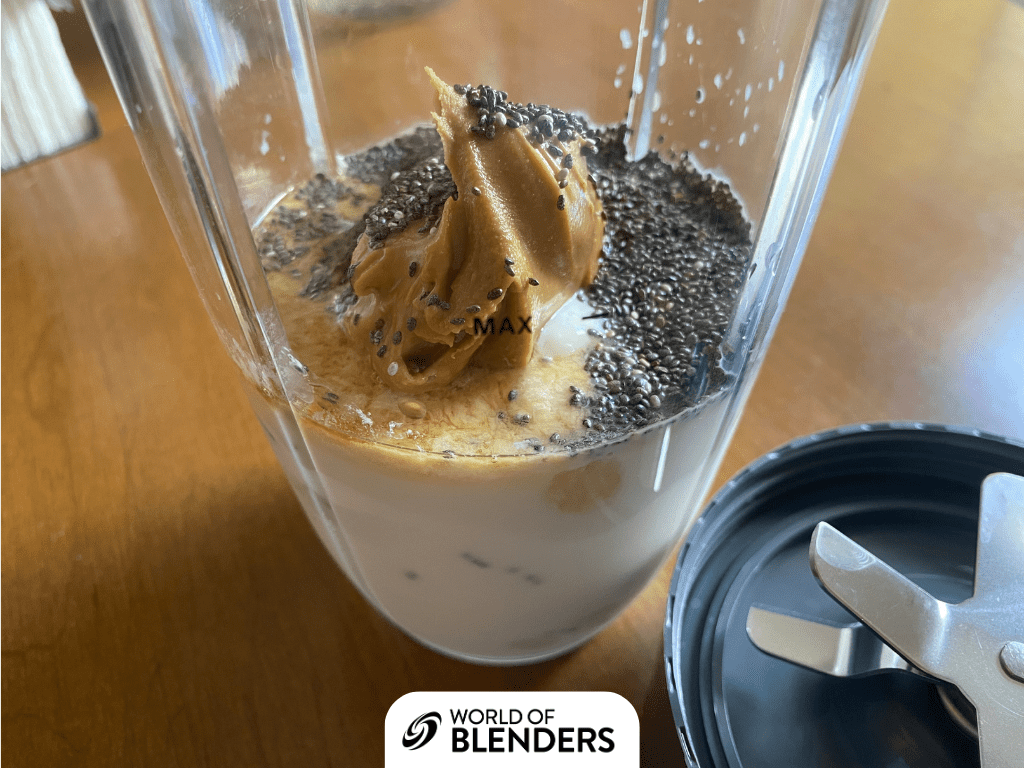
4. Tofu
Tofu is a soy-based vegan alternative to animal products. Adding tofu to your smoothie will make it thicker, and add 10.9g of protein per ¼ cup serving without adding too much fat or many calories. Tofu is also a good source of calcium and iron.
5. Regular Yogurt
Though not quite as thick, creamy and protein-rich as greek yogurt, regular yogurt will still thicken up your smoothie and add some creaminess. It will also provide 6.5g of protein per ½ cup serving, along with calcium, vitamin B12, and probiotics.
Regular yogurt usually has more sugar so it can be a great way to make smoothies sweeter.
6. Hemp Seeds
As well as being a great source of protein (6.3g per 2 tbsp serving), hemp seeds are rich in omega-3 and omega-6 fatty acids, which help the cells in your body to function properly. Hemp seeds are also a good source of fiber. Hemp seeds are also really popular in our list of high fiber smoothies for constipation.
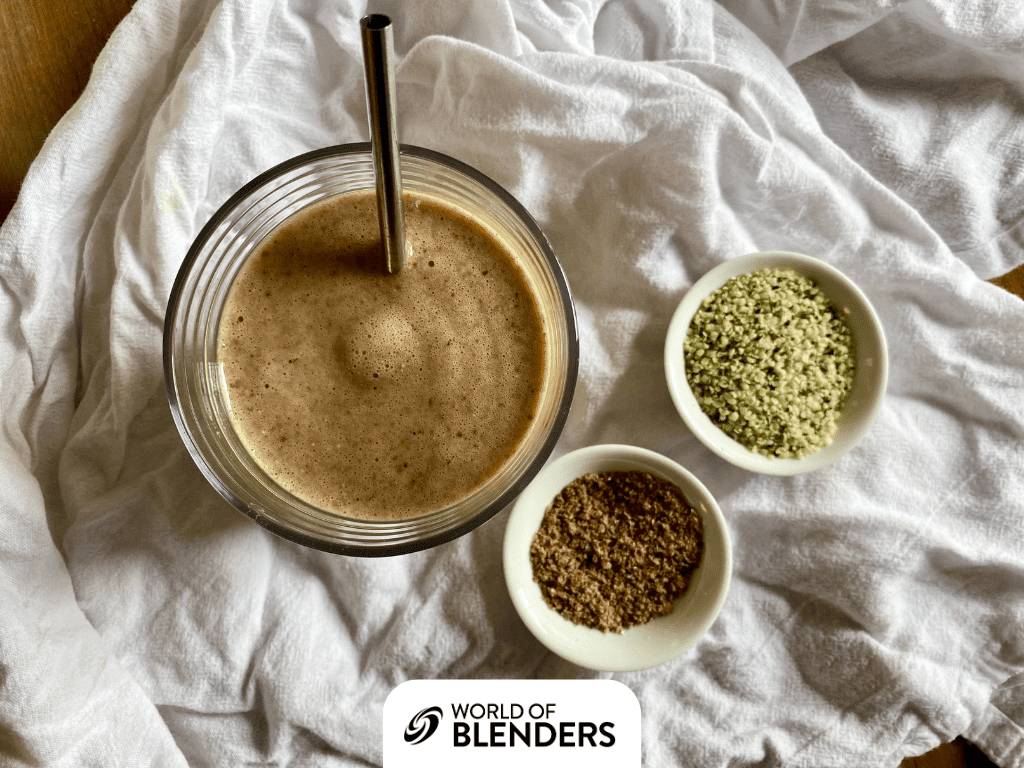
7. Chia Seeds
Like hemp seeds, chia seeds are packed with protein (5g per 2 tbsp serving) and other nutrients, such as fiber, omega-3 fatty acids, calcium, and iron. Chia seeds are great for making smoothies creamy and to make smoothies smoother.
8. Kefir
Similar to yogurt, kefir is a sour-tasting fermented milk made using a culture of yeast and bacteria. It contains probiotics that support gut health and contains 4.6g of protein per ½ cup. Kefir is one of our favorite substitutes for yogurt in smoothies! It’s also commonly used in our list of colon cleansing smoothie recipes!
9. Edamame
Edamame are immature soybeans that are still contained within their pod. Though often eaten as a snack, edamame are also a nutritional addition to smoothies, adding fiber, iron, and 4.5g of protein per ¼ cup. Edamame are one of the best vegetables for smoothies!
10. Pumpkin Seeds
Pumpkin seeds are a good source of protein, healthy fats, and minerals, including magnesium and zinc. Adding 2 tbsp of pumpkin seeds to your smoothie will boost its protein content by 4.4g. The pumpkin seeds are a great topping for green smoothie recipes or breakfast smoothies for weight loss!
11. Lentils
Lentils are a type of legume that is rich in protein and fiber. A ¼ cup of cooked lentils will add 4.3g of protein to your smoothie. Red lentils are a good choice for smoothies, as they provide the smoothest texture and can be boiled in as little as 15 minutes.
12. Milk
If you’re looking to add protein to your smoothie then choosing milk as your base liquid is a good start. Unlike alternative liquids, such as water or fruit juice, milk is packed with protein – 4.2g per half cup – and will provide calcium, vitamin D, and vitamin B12 too.
We have a list of the best milks for smoothies you can pick from! If you can’t drink milk, check out our list of dairy free smoothie recipes!
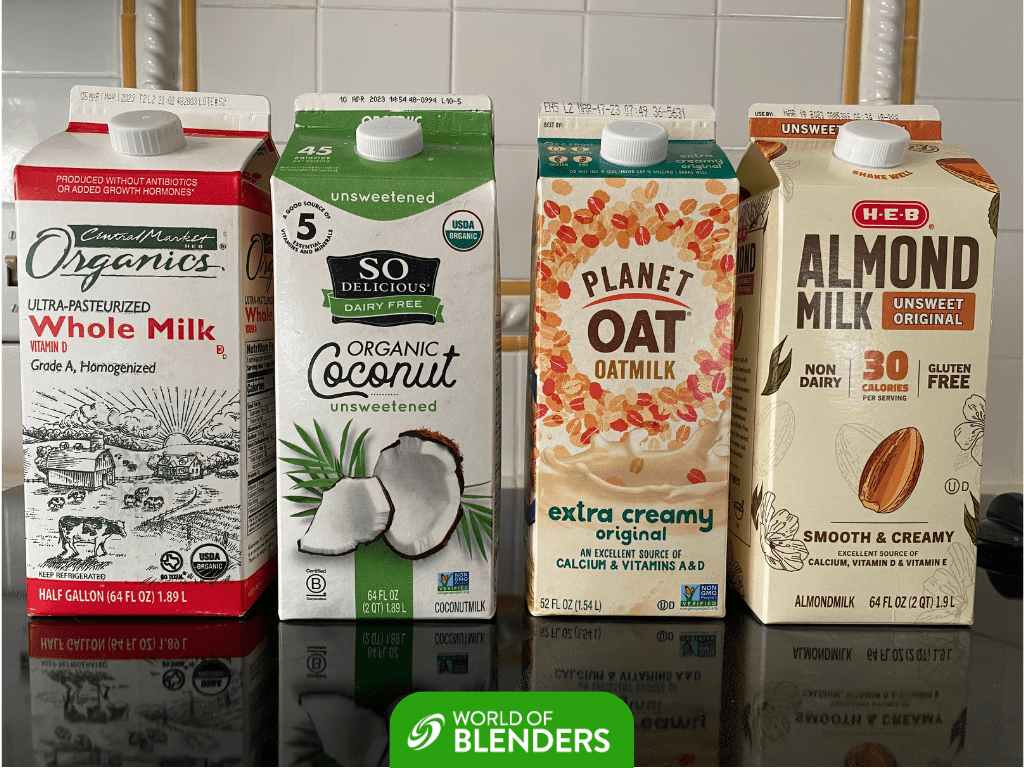
13. Egg Whites
Egg whites are a good source of protein and are low in fat and calories. One large egg contains up to 4 grams of protein within the egg white. This is popular for paleo weight loss smoothies!
14. Sunflower Seeds
Sunflower seeds will add 3.6g of protein for every 2 tbsp you crush into your smoothie. Like other types of seeds, they are rich in healthy fats and minerals, including magnesium and zinc.
15. Peanut Butter
Peanut butter is a popular smoothie ingredient because of its delicious nutty flavor and creamy texture. Peanuts contain healthy fats, vitamin E, magnesium, and potassium, and you can expect a protein boost of 3.6g for every tablespoon of peanut butter you add to your smoothie. The only downside is the calorie count, as your tablespoon of peanut butter will also contain around 94 calories.
Peanut butter is one of the best ways to make smoothies more filling and it’ll also help make smoothies thicker!
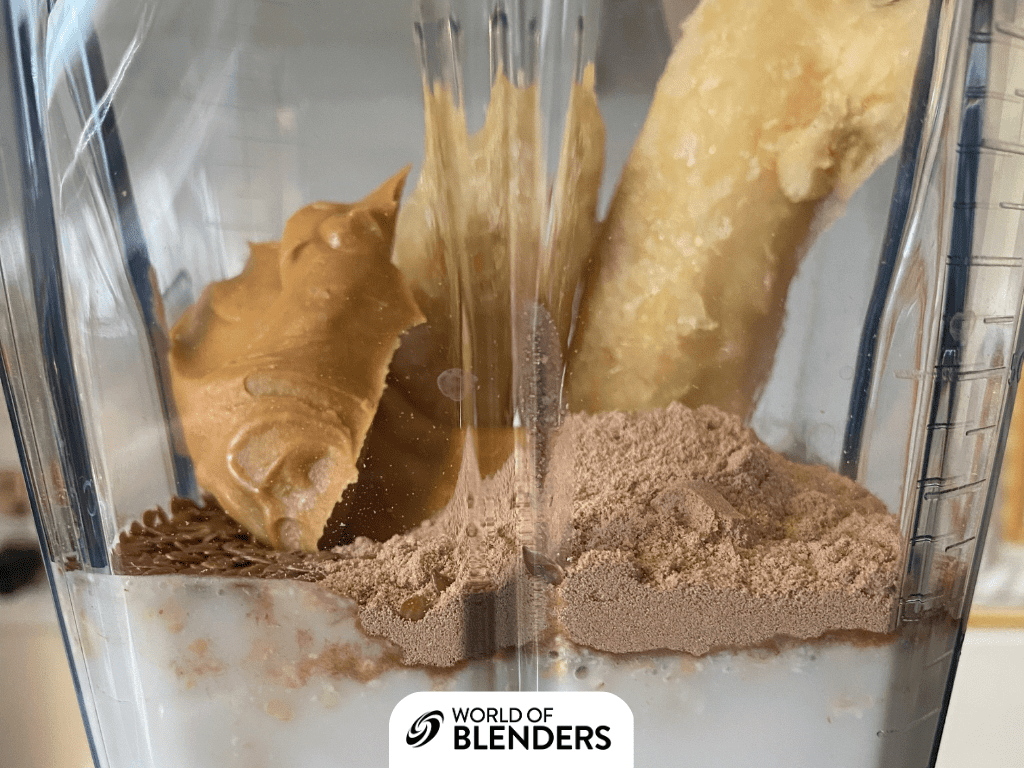
11 Protein-Packed Smoothie Recipes
I’ve made hundreds of smoothies over the years and these are my 11 favorite protein packed smoothie recipes. I’ve broken them down by total protein content and how much each ingredient provides.
1. Berry Almond Smoothie (23.1g of protein)
- 1/2 cup frozen mixed berries (0.7g protein)
- 1/2 cup unsweetened almond milk (1.5g protein)
- 1/2 cup plain Greek yogurt (11.6g protein)
- 2 tbsp almond butter (6.8g protein)
- 1 tbsp chia seeds (2.5g protein)
- 1/2 tsp vanilla extract
2. Chocolate Banana Smoothie (22.9g of protein)
- 1 medium banana (1.3g protein)
- 1 tbsp cocoa powder (1g protein)
- 1/2 cup plain Greek yogurt (11.6g protein)
- 1/2 cup unsweetened almond milk (1.5g protein)
- 1/4 cup raw cashews (5g protein)
- 1 tbsp chia seeds (2.5g protein)
3. Green Protein Smoothie (22.7g of protein)
- 1 cup spinach (0.9g protein)
- 1/2 cup kale (1.3g protein)
- 1/2 avocado (1.5g protein)
- 1/2 cup unsweetened almond milk (1.5g protein)
- 1/2 cup plain Greek yogurt (11.6g protein)
- 1 tbsp almond butter (3.4g protein)
- 1 tbsp chia seeds (2.5g protein)
This one is a great whole30 smoothie recipe!
4. Spinach & Mango Smoothie (22g of protein)
- 1 cup baby spinach (0.9g protein)
- 1/2 cup frozen mango (0.5g protein)
- 1/2 cup plain Greek yogurt (11.6g protein)
- 1/4 cup unsweetened almond milk (1.5g protein)
- 1/4 cup raw cashews (5g protein)
- 1 tbsp chia seeds (2.5g protein)
- 1/2 tsp vanilla extract
5. Tropical Mango Smoothie (21.1g of protein)
- 1 cup frozen mango (1g protein)
- 1/2 cup plain Greek yogurt (11.6g protein)
- 1/2 cup unsweetened coconut milk (1g protein)
- 1/4 cup raw cashews (5g protein)
- 1 tbsp chia seeds (2.5g protein)
6. Vanilla Berry Smoothie (20.5g of protein)
- 1 cup mixed frozen berries (1.4g protein)
- 1/2 cup plain Greek yogurt (11.6g protein)
- 1/2 cup unsweetened almond milk (1.5g protein)
- 1/4 cup raw walnuts (3.5g protein)
- 1 tbsp chia seeds (2.5g protein)
- 1/2 tsp vanilla extract
7. Peanut Butter Banana Smoothie (20.5g of protein)
- 1 medium banana (1.3g protein)
- 1 tbsp peanut butter (3.6g protein)
- 1/2 cup plain Greek yogurt (11.6g protein)
- 1/2 cup unsweetened almond milk (1.5g protein)
- 1 tbsp chia seeds (2.5g protein)
- 1/2 tsp vanilla extract
- Ice cubes
8. Apple Cinnamon Smoothie (20.4g of protein)
- 1 medium apple (0.5g protein)
- 1/2 cup plain Greek yogurt (11.6g protein)
- 1/2 cup unsweetened almond milk (1.5g protein)
- 2 tbsp almond butter (6.8g protein)
- 1/2 tsp cinnamon
9. Oatmeal Banana Smoothie (16.5g of protein)
- 1 medium banana (1.3g protein)
- 1/2 cup rolled oats (6g protein)
- 1/2 cup unsweetened almond milk (1.5g protein)
- 1/2 cup unsweetened applesauce (0.2g protein)
- 1/4 cup raw cashews (5g protein)
- 1 tbsp chia seeds (2.5g protein)
10. Chocolate Almond Smoothie (15.9g of protein)
- 1 medium banana (1.3g protein)
- 1 tbsp almond butter (3.6g protein)
- 1 tbsp cocoa powder (1g protein)
- 1/2 cup unsweetened almond milk (1.5g protein)
- 1/4 cup raw almonds (6g protein)
- 1 tbsp chia seeds (2.5g protein)
11. Peanut Butter Blueberry Smoothie (15.6g of protein)
- 1 cup frozen blueberries (1g protein)
- 1 tbsp peanut butter (3.6g protein)
- 1/2 cup unsweetened almond milk (1.5g protein)
- 1/4 cup raw almonds (6g protein)
- 1 tbsp hemp seeds (3.5g protein)
- 1/2 tsp vanilla extract
Common Questions About Adding Protein to Smoothies
Some of the best ingredients you can use to thicken a smoothie without protein powder are: 1) Frozen fruit such as banana and avocado, 2) Fibrous vegetables such as carrot or sweet potato, 3) Nut butter, 4) Thick dairy products such as yogurt and cottage cheese, 5) Oats, 6) nuts and, 7) seeds.
Milk is high in protein (4.2g per ½ cup), whereas water will not add protein to your smoothie. If you want to use water instead of milk in your protein smoothie, you will need to make up for the lost protein by adding other protein-rich ingredients, such as cheeses, yogurts, seeds, tofu, or egg.
Final Verdict: The Key To Adding Protein To Smoothies Without Protein Powder
The best way to add protein to a smoothie without using protein powder is to include ingredients that are naturally high in protein.
Our favorites are cottage cheese, ricotta cheese, greek yogurt, tofu, regular yogurt, hemp seeds, and chia seeds. All of these ingredients will add at least 5g of protein per serving.
